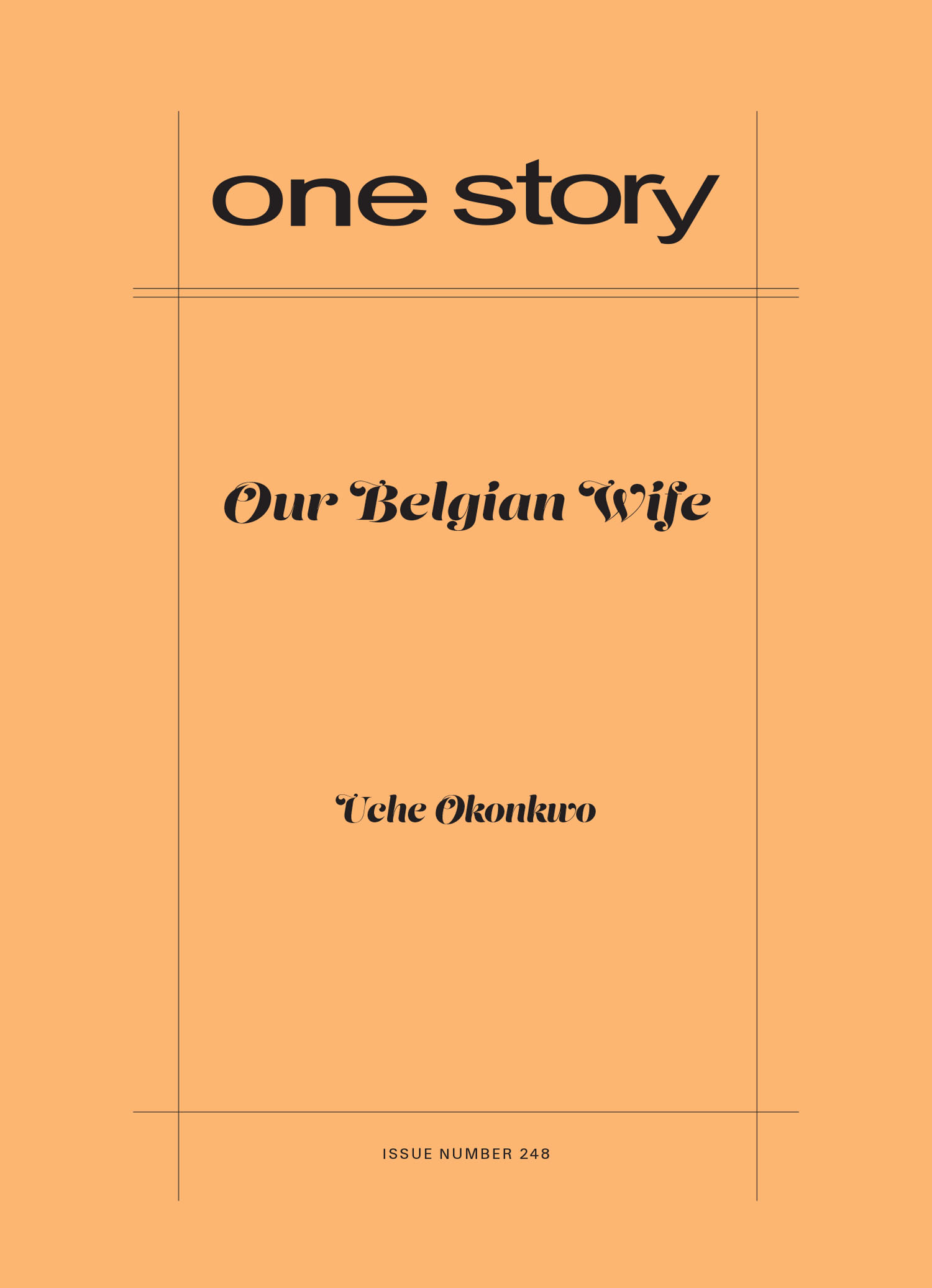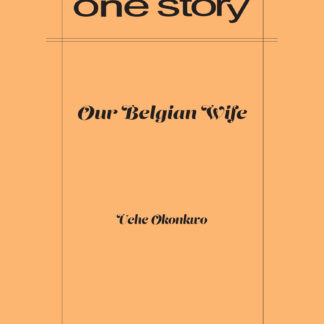
Our Belgian Wife
$2.50
19 in stock
Excerpt
Udoka was disappointed to find that her prospective in-laws’ house wasn’t two stories tall, with a uniformed guard and a big gate to keep out prying eyes. But though not as impressive as Udoka had imagined, it was still a better house than her mother’s. It was painted, for one, and the corrugated roof wasn’t coming apart with rust.
Udoka knew exactly what this visit was. When her mother had come home two weeks ago from her trip to Orlu, where she’d attended the burial of a distant relative, singing about God’s rain of blessings, Udoka had known that something very good had happened.
“You remember my friend, Marigold, who lives in Orlu?” her mother had begun as she unpacked her bag. “I went to visit her and she told me something.”
Udoka waited as her mother took out yet another item from her bag: a kitchen towel, a souvenir from the funeral. She handed it to Udoka.
“What did she tell you, Mama?” Udoka finally asked.
“She told me her son is looking for a wife,” her mother said with a grin. “The same son that went to Belgium . . . fifteen years ago?”
Uche Okonkwo
Uche Okonkwo is a Nigerian writer and an MFA fiction candidate at Virginia Tech. Her work has been published in Ploughshares, Lagos Noir, Per Contra, and Ellipsis. She was a spring 2017 resident at Writers Omi, Ledig House.
Will Allison on “Our Belgian Wife”
The story in our latest issue hit home for me as a parent. My sixteen-year-old daughter and I are currently negotiating the fraught dance that is a child’s transition to independence. My daughter is already very much her own person, but the impulse is still there for me to meddle in her affairs, to try to solve her problems and fix her mistakes.
The Nigerian mothers in Uche Okonkwo’s “Our Belgian Wife” suffer from the same misguided impulse. Agatha, an impoverished widow, only wants what’s best for her daughter, Udoka, and Agatha’s friend Marigold only wants what’s best for her estranged expatriate son, Uzor. So the two mothers conspire to arrange a marriage between their children.
Never mind that Udoka and Uzor are young adults, capable of managing their own affairs. Never mind that they don’t know each other. Never mind that Udoka is busy pursuing a college degree. And never mind that she is already engaged to Enyinna, a devoted but poor shopkeeper.
As I watched the mothers’ meddling spiral out of control, I was reminded of times I’ve tried to engineer good outcomes for my own daughter when all she wanted was for me to butt out. And I was reminded that things rarely went as I planned. I can only hope that I will have learned my lesson by the time my daughter is Udoka’s age. In the meantime, I invite you to join me in appreciating the humor and heartbreak that Okonkwo’s all-too-human characters wreak upon each other, and in welcoming a strong and distinctive new voice to our pages.
Q&A by Will Allison
- WA: Where did the idea for this story come from?
- UO: The story was largely inspired by characters from Nigerian movies. The controlling and overdramatic but well-meaning mother figure is a trope in many of these films, which I grew up watching and still do. I wanted to explore the dynamic that might exist in a mother-daughter relationship fraught with these kinds of tensions and further complicated by financial anxiety, guilt, and a sense of obligation.
- WA: What was the most challenging aspect of writing this story?
- UO: The thing that I struggled the most with was making the characters, Agatha and Marigold in particular, feel human, and not like parodies or caricatures. I think that would have been an easy trap to fall into with a story like this, and so, while revising, it was important to find a way to give voice to the concerns and anxieties that motivate them to act in the horrible ways that they do.
- WA: You were born in Lagos, Nigeria; you attended college in Nigeria; you attended grad school at the University of Manchester in England; and you are now pursuing an MFA in fiction writing at Virginia Tech. Why did you choose to study in the United States?
- UO: There aren’t a whole lot of fully funded MFA programs outside the United States, and so once I decided to apply to MFAs, it had to be here. At the time when I began applying, I was considering making some kind of career change (I had worked in publishing for many years in Lagos) and thought that an MFA might be a good way to transition. The time and focus that a fully funded MFA program allows was also a huge draw.
- WA: One thing I love about “Our Belgian Wife” is the story’s strong sense of place. How did you pick the village of Umueze for the story’s setting?
- UO: A story like this could have taken place in almost any village in southeastern Nigeria, with their similarities in language and culture. I chose Umueze specifically because it’s located near an area that I lived in for a while, and so it felt natural to set a story there. Another reason was simply a matter of logistics, its proximity to the other locations (Orlu and Onitsha) that the story takes place in.
- WA: Another thing I love about “Our Belgian Wife” is the story’s humor, which often takes the form of characters judging other characters harshly while failing to see their own faults. Can you talk about the role of humor in your fiction?
- UO: I appreciate and enjoy humor but don’t think of myself as a funny person (or writer), and so I’m often surprised when I manage to write something humorous. I don’t think it would have been possible to write “Our Belgian Wife” without humor, though, and so I am pleased that it comes across. When I do write humor, it’s often the same kind that you find in this story: the funniness often derives from irony, sarcasm, characters’ lack of self-awareness.
- WA: Does the Nigerian storytelling tradition differ from American storytelling in ways that affect your writing?
- UO: A lot of the Nigerian literature and films that I grew up reading and watching had a spiritual sensibility that informed place/setting, and characters’ motivation and choices in ways that affect what and how I write, and the way I see the world. It fostered, in me, an acceptance of the mysterious, things that cannot ever be explained or measured, and I have found this to be fuel for my imagination. I’m interested in exploring how this affinity for the mysterious interacts with (a very slowly emerging) secularity in contemporary Nigeria.
- WA: How long did it take you to complete this story?
- UO: I started “Our Belgian Wife” in 2012. The first draft probably took a couple of days to write, but since then the story has gone through workshops and extensive revisions.
- WA: What are you working on now?
- UO: I’m working on a bunch of short stories, and a novella, that I hope to compile into a collection.
- WA: What is the best bit of advice about writing you have ever received?
- UO: “Don’t write what you don’t know”—the idea being that if I want to write about something I don’t know, I should probably learn about it first. I’m not sure if it’s the best bit of advice, but it’s maybe the most memorable and has worked for me so far.
